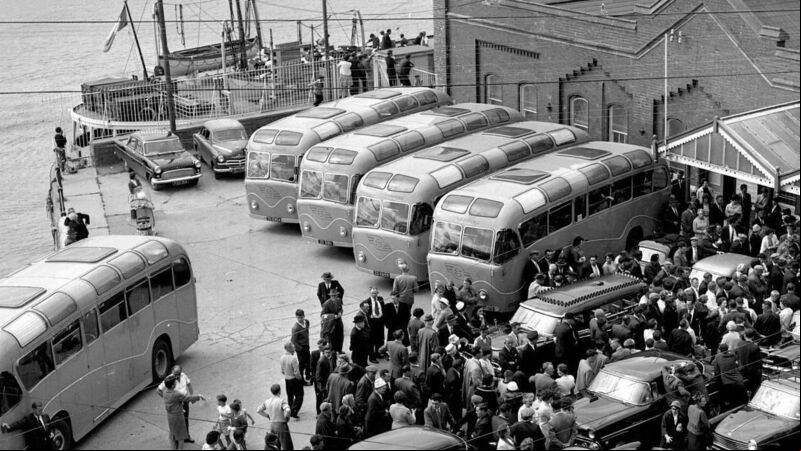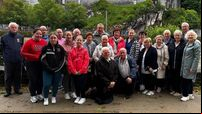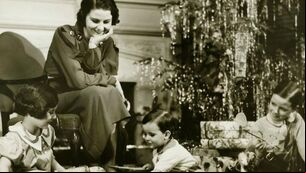A lifetime spent on the Cork coast... and so many happy memories

It’s a great spot, full of history, and like any place surrounded by water, it has seen its fair share of tragedies. But plenty of good times too.
The sea has always played a large part in our family life.
My mother was born and raised on Spike Island and her father worked on the Department of Defence boats operating around Cork Harbour.
My grandmother was a midwife based on Spike and she, like all the other inhabitants, had to rely on a launch to get to Cobh.
When the weather was too bad, travel was impossible, and the islanders had to sit tight. A teacher travelled to the island every day from the mainland to run the little school.
I my mother telling me that she often prayed for a storm when she didn’t feel like going to school, because the teacher would be stranded, and the kids would have a day off.
The family left Spike Island and moved to Cobh in the early 1940s, which was in reality changing one island for another. They settled in a terraced house on top of a hill on the eastern part of the town with unrestricted views of the harbour, and that’s the house I grew up in.
In those days, there was very little light to be seen around the harbour at night. Street lighting was practically non-existent, so the surrounding areas of Whitegate, Spike Island, and Haulbowline were really dark.
When I got older, my friends and I used to play down by the seashore. We would pick periwinkles at low tide and fill potato sacks, which we kept submerged in the water to keep the winkles fresh until the guy came to collect them in his van. He had a weighing scale and would give us a few pence per stone in weight.
We’d bring some home to the parents too and they would boil them in a pot of water and drain them into a bowl. The winkles would be picked out of their shell with a pin and straight into the mouth. They didn’t last long.
There was no shortage of fish either. Word would spread when the mackerel were breaking and everyone charged to the seashore, armed with fishing rods or a line of feathers. Fresh fish were always welcome at home, and when the spoils were good, the neighbours were looked after too.
On a good day, we’d have money to put petrol into the outboard engine, failing that, we had to use elbow grease and pull the oars. That was OK when rowing with the tide, but a much different story when pulling against it. Progress was slow.
We had no fear of the sea. We were all competent swimmers, which was just as well because I’m sure we didn’t have a single life-jacket between us. But in those days, there was lots of activity around the harbour and always plenty of people to keep an eye on us. They were great, carefree times.
Sometimes, when you’ve grown up in a place, it takes an outsider to remind you of what you have on your doorstep, like Irish Central, an Irish website in North America which spreads news of all things Irish.
It reminds us that if you claim Irish descent, there is a good chance that your ancestors left Ireland through Cobh. It was the departure point for 2.5 million of the six million Irish people who emigrated to North America between 1848 and 1950. Like Annie Moore, the first immigrant to through the Ellis Island immigration facility in New York Harbour on January 1, 1892.
A statue of her and her two brothers stands outside the Heritage Centre in Cobh, and that centre is a must-see for any visitor to the town. You can learn about the arrival of the railway in Cobh in 1862 that facilitated the mass emigration of people from Cork Harbour.
It’s well known by now the Titanic’s last port of call was Cobh and a visit to the Titanic Experience is essential. On April 11, 1912, that ship dropped anchor off Roche’s Point at the entrance to Cork Harbour and picked up 123 engers, who were brought to the ship from Cobh. Four days later, it struck an iceberg and almost 1.500 souls were lost.
In 1915, the Lusitania was sunk off the Cork coast by a torpedo fired by a German U-boat; 1,198 people perished and that tragedy also had a connection with the people in Cobh, as the dead, injured and bereaved were brought to the town.
Of the 289 bodies that were recovered, 169 were buried in the Old Church Cemetery just outside the town.
These days, seafarers visit the town in happier times. Thousands of engers from more than 100 cruise ships disembark in Cobh every year, and they bring a lot of life to the town, as do the visitors from around the country who come to see the liners.
The scenery changes every day when you live on the coast and there’s something very relaxing about watching the slow-moving activity of the various boats moving about the harbour.
There’s always something new to see.







 App?
App?




